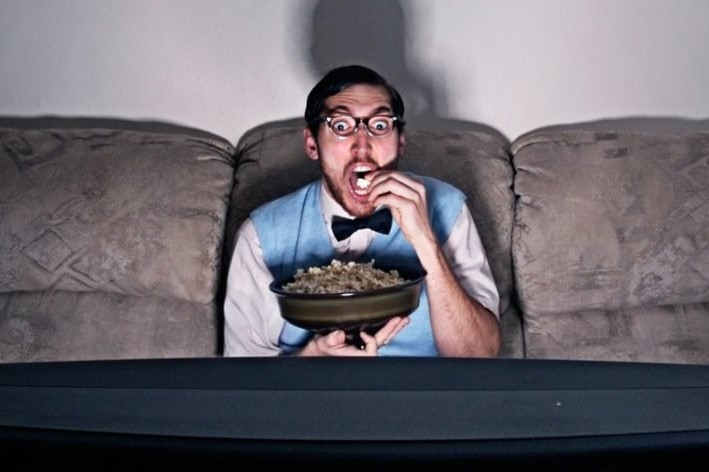
TV series addiction: what is binge-watching?
What is TV series addiction (binge-watching): how many episodes of our ‘of the moment’ TV series are we able to watch at one time? Have we ever felt ‘guilty’ about the way we watch these programmes? Did we ever realise that the ‘binge’ consumption of certain shows was beginning to affect our personal and interpersonal sphere?
The multiplication of platforms with an offer of streaming programmes (films, TV shows, TV series, cartoons…) has progressively changed the way we ‘consume’ such products: we have the possibility of accessing a huge amount of programmes with just one ‘click’, without waiting for them to air from week to week and without the interruption of advertising (Smith, 2014).
What is meant by binge-watching (TV series addiction)?
The term ‘binge’ refers to the ‘binge’ behaviour typical of pathological addictions and eating disorders, indicating the intake of a large amount of a ‘substance’ (the specific object of the addiction) in a short period of time, with the possible onset of depressive symptoms (guilt, anxiety, sadness, restlessness…) at the end of the intake and with increasing repercussions on personal functioning (social life, psychological well-being…).
Binge-watching (i.e. TV-series addiction) is defined as the habit whereby one watches a number of episodes of a TV show or series in quick succession and in a short space of time.
This type of viewing would allow the video addict instant gratification.
It has been observed that addictive behaviour related to TV programmes seems to particularly affect TV series, precisely because of their structuring into episodes and seasons and the peculiar characteristics of their plot (Devasagayam & College, 2014).
Lesley Lisseth Pena (2015) has studied the phenomenon of TV series addiction through a series of interviews, focusing on the identikit of the ‘series addict’: binge-watchers experience an internal compulsive urge to watch one episode after another, feel the craving (intense desire to see the next episode) and devote a considerable amount of time to watching their favourite programme (perhaps at the expense of other activities). Over time, this behaviour is associated with remorse, guilt and depressive symptoms.
But what links exist between TV series addiction and psychological health?
In a 2015 paper, Katherine Wheeler delved into the phenomenon of binge-watching in a sample of college students, relating it to a number of variables such as loneliness, depression, attachment and a range of interpersonal and personal factors.
She observed that people with anxious attachment (e.g. those with a constant worry of being abandoned) reported higher frequencies of TV series addiction.
Those with significant levels of depressive symptoms also tended to report higher frequencies of ‘TV binge’ episodes.
The same correlation did not exist when considering normal, i.e. ‘non-binge’, viewing of TV programmes.
The result allowed Wheeler to hypothesise a specificity of TV series addiction in connection with the psychological dimensions investigated.
The results of the literature on the subject point to binge-watching as a risk factor for the onset of anxiety/depressive symptoms, but also as an indicator of the existence of these symptoms.
Many studies have shown that compulsive viewing of TV episodes can act as an emotional regulation strategy, blocking out negative emotions and acting as an escape route from life’s problems.
TV-series addicts can sink into a ‘trance-like’ state
As in substance addictions, the compulsive series watcher may seek to produce again the positive feeling experienced during the viewing and may fantasise during the day about the moment when he will be able to devote himself to his programme again, beginning to notice repercussions on his personal and interpersonal psychic life in the course of time (Page et al., 1996; Kremar et al., 2010).
Read Also
Emergency Live Even More…Live: Download The New Free App Of Your Newspaper For IOS And Android
Internet Addiction: Symptoms, Diagnosis And Treatment
Porn Addiction: Study On The Pathological Use Of Pornographic Material
Compulsive Shopping: Causes, Symptoms, Diagnosis And Treatment
Facebook, Social Media Addiction And Narcissistic Personality Traits
Developmental Psychology: Oppositional Defiant Disorder
Pediatric Epilepsy: Psychological Assistance
The (Growing) Army Of Hikikomori In Italy: CNR Data And Italian Research
Anxiety: A Feeling Of Nervousness, Worry Or Restlessness
What Is OCD (Obsessive Compulsive Disorder)?
Nomophobia, An Unrecognised Mental Disorder: Smartphone Addiction
Impulse Control Disorders: Ludopathy, Or Gambling Disorder
Gambling Addiction: Symptoms And Treatment
Alcohol Dependence (Alcoholism): Characteristics And Patient Approach
Hallucinogen (LSD) Addiction: Definition, Symptoms And Treatment
Compatibility And Interactions Between Alcohol And Drugs: Useful Information For Rescuers
Fetal Alcohol Syndrome: What It Is, What Consequences It Has On The Child
Alcoholic And Arrhythmogenic Right Ventricular Cardiomyopathy
About Dependence: Substance Addiction, A Booming Social Disorder
Cocaine Addiction: What It Is, How To Manage It And Treatment
Workaholism: How To Deal With It
Heroin Addiction: Causes, Treatment And Patient Management
Childhood Technology Abuse: Brain Stimulation And Its Effects On The Child
Post Traumatic Stress Disorder (PTSD): The Consequences Of A Traumatic Event
Sexual Addiction (Hypersexuality): Causes, Symptoms, Diagnosis And Treatment
Do You Suffer From Insomnia? Here’s Why It Happens And What You Can Do
Erotomania Or Unrequited Love Syndrome: Symptoms, Causes And Treatment
Recognising The Signs Of Compulsive Shopping: Let’s Talk About Oniomania
Web Addiction: What Is Meant By Problematic Web Use Or Internet Addiction Disorder
Video Game Addiction: What Is Pathological Gaming?
Pathologies Of Our Time: Internet Addiction
Porn Addiction: Study On The Pathological Use Of Pornographic Material


